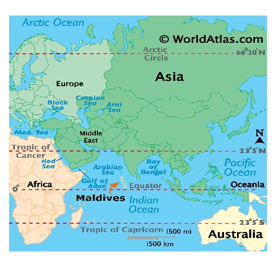

26th July 2025 (14 Topics)
Context
On July 25, 2025, Prime Minister Narendra Modi and Maldivian President Dr. Mohamed Muizzu jointly released commemorative stamps to mark the 60th anniversary of the establishment of India–Maldives diplomatic relations.
India–Maldives Diplomatic Relations
Historical Context & Evolution of Ties
- Establishment of Relations (1965): Diplomatic ties began post-British withdrawal from Maldives.
- India’s Role Post-2008: India built wide-ranging ties with Maldivian political, military, and civil society stakeholders post-Maldives’ democratic transition.
- Operation Cactus (1988): India thwarted a coup attempt, showcasing commitment to Maldives' sovereignty.
Strategic and Geopolitical Significance
- Strategic Location: Maldives is positioned along vital Indian Ocean shipping lanes and south of Lakshadweep; crucial for India’s maritime surveillance.
- Eight Degree Channel: Separates India's Minicoy Island from the Maldives; a critical sea route for global trade and naval logistics.
- Indian Ocean Stability: Maldives’ peace aligns with India’s "Neighbourhood First" and SAGAR (Security and Growth for All in the Region) doctrine.
Cultural and Historical Linkages
- Buddhist Past: Until the 12th century, Maldives practised Vajrayana Buddhism; Indic civilizational influence is deeply rooted.
- People-to-People Ties: Common heritage fosters goodwill, bolstered by Indian diaspora and education ties.
Economic and Developmental Engagement
- Essential Commodities: India exports rice, medicines, vegetables, etc., critical for Maldives' sustenance.
- Infrastructure Assistance: Supply of cement, rock boulders; large-scale projects under India’s Line of Credit (LoC).
- Indian Tourists: India has been the top tourist source for Maldives post-COVID, contributing over 11% of tourist arrivals in 2023.
Education and Capacity Building
- Higher Education Destination: India is a preferred hub for Maldivian students; scholarships and medical education are key areas.
- Human Resource Development: Technical and professional training under Indian Technical and Economic Cooperation (ITEC) programme.
Defence and Security Cooperation
- Military Presence: India maintains a limited defence presence for humanitarian assistance, maritime surveillance, and radar integration.
- Joint Exercises:
- Dosti (Coast Guard with Sri Lanka),
- Ekuverin (Bilateral army exercise),
- Ekatha (Special forces/maritime exercises).
- Disaster Relief Partner: India helped during 2004 tsunami, drinking water shortages (2014), and COVID-19 crisis.
Challenges in India–Maldives Defence Ties
Geopolitical Rivalries
- China’s Strategic Presence:
- Chinese projects like Sinamale Bridge and port development under BRI signal a power shift.
- Risk of Maldives becoming part of China's ‘String of Pearls’ strategy in the Indian Ocean.
- Debt-Trap Diplomacy Concerns:
- Maldives has incurred significant debt to China, reducing strategic autonomy and raising sovereignty risks.
Internal Political Volatility
- "India Out" Campaign (2023):
- Spearheaded by opposition forces citing threats to sovereignty due to Indian troop presence.
- Led to public resentment and government pressure to remove Indian military personnel.
- Frequent Policy Reversals:
- Shift in power from India-friendly to pro-China regimes undermines strategic consistency.
Security Concerns
- Terrorism and Radicalization:
- Maldives has the highest per capita foreign fighters for ISIS from South Asia.
- Presence of Pakistan-backed jihadi networks raises red flags for India’s maritime and regional security.
- Maritime Vulnerabilities:
- Increasing militarization around strategic chokepoints like the Eight Degree Channel.
Way Forward
Multilateral and Trilateral Engagement
- IORA, SAGAR Initiative: Push Maldives’ participation in regional maritime cooperation frameworks.
- Trilateral Maritime Dialogue (India–Maldives–Sri Lanka): Revive and institutionalize it for counter-piracy, HADR (Humanitarian Assistance & Disaster Relief), and intel-sharing.
Infrastructure and Strategic Projects
- Fast-track Completion of Indian Projects: Projects like Greater Male Connectivity Project (GMCP) must serve as visible alternatives to Chinese-funded infrastructure.
- Dual-Use Facilities: Develop ports, radar stations, and airstrips that can serve both civilian and security purposes.
Soft Power & Public Diplomacy
- Civil-Military Assistance: Enhance India's visibility via humanitarian missions, medical diplomacy, and climate resilience efforts.
- Education and Cultural Linkages: Scholarships, Hindi/Malayalam language courses, and student exchanges to shape a positive Indian image.
Security Cooperation with Transparency
- Clarity on Military Presence: Clearly communicate the non-combat role of Indian military personnel (e.g., operating aircraft gifted to Maldives).
- Counterterrorism Training: Joint training programs for Maldivian forces to tackle radicalization and improve internal security.
More Articles



